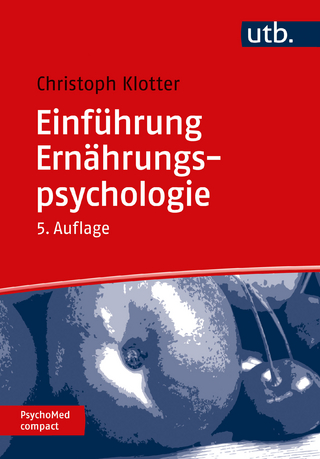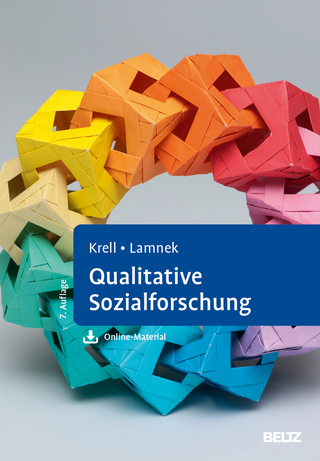
Essential Social Psychology
SAGE Publications Ltd (Verlag)
978-1-4462-7076-9 (ISBN)
- Titel erscheint in neuer Auflage
- Artikel merken
From aggression to altruism, prejudice to persuasion, Essential Social Psychology 3e introduces students to the discoveries and debates that define social psychology today. It covers both classic and cutting edge research studies and provides plenty of real life examples and illustrations to help students to develop a good understanding of the subject whilst building the confidence to apply this knowledge successfully in assignments and exams. An extensive range of learning aids including a glossary, summary sections and memory maps – combined with an array of features on the student section of the companion website – will help reinforce this learning and check retention at specific milestones throughout the course.
New to the third edition:
A new full-colour design
Two brand new chapters on Applied Social Psychology and Social Psychological Methods
Coverage of some developing research perspectives including social neuroscience and evolutionary psychology
New ‘Back to the Real World’ textboxes which situate academic findings in the context of the world around you
An enhanced SAGE edge™ companion website (study.sagepub.com/crispandturner3e) with a suite of features to enhance your learning experience.
Richard Crisp is Professor of Social Psychology at Durham University. He read Experimental Psychology at the University of Oxford and carried out his doctoral research at Cardiff University. In addition to Durham University Richard has held positions at the Universities of Birmingham, Kent and Sheffield as well as the Aston Business School. Richard’s research has covered the full range of topics that comprise social psychology, from the formation and reduction of prejudice, to the self and identity processes involved in interpersonal relations, from mere exposure and attitude formation, to stereotyping and social categorization. He has published this work in over 150 articles, chapters and books, including papers in American Psychologist, Psychological Science, Psychological Bulletin and Science. This work has been recognized with awards from scholarly societies, including the British Psychological Society President’s Award for Distinguished Contributions to Psychological Knowledge and Spearman Medal. Together with Rhiannon Turner he received the 2011 Gordon Allport Intergroup Relations Prize from the Society for the Psychological Study of Social Issues (for the best paper of the year on intergroup relations). He is Editor-in-Chief of the Journal of Applied Social Psychology and was founding editor of the Journal of Theoretical Social Psychology. He is a Fellow of the Academy of Social Sciences, a Fellow of the Association for Psychological Science and a Fellow of the British Psychological Society. Rhiannon Turner is Professor of Social Psychology at Queen’s University Belfast. She did her undergraduate degree at Cardiff University, her Master’s degree at the University of Kent, her doctoral research at the University of Oxford, and her postdoctoral research at the University of Birmingham. In 2007, she took up a lectureship at the University of Leeds, and she was appointed Chair at Queen’s University Belfast in 2012. The main focus of her research is intergroup relations, with a particular interest in direct and indirect forms of contact (such as extended, online, and imagined contact, and nostalgic recall of contact) as a means of changing intergroup attitudes and behaviour. She has published over 100 articles, chapters and books, including papers in American Psychologist, Journal of Personality and Social Psychology, and Psychological Bulletin, and her research has been funded by grants from the British Academy, Economic and Social Research Council, Engineering and Physical Sciences Research Council, Global Challenges Research Fund, Leverhulme Trust and the National Institute for Health Research. She has won the British Psychological Science award for Outstanding Doctoral Research Contributions to Psychology, the Foundation for Personality and Social Psychology’s Robert B. Cialdini Award for contributions to field research in social psychology and, together with Richard Crisp, the Gordon Allport Intergroup Relations Prize from the Society for the Psychological Study of Social Issues. She has held various editorial roles including Editor-in-Chief of the European Review of Social Psychology. She is currently on the editorial board of Journal of Personality and Social Psychology, British Journal of Social Psychology, and Group Processes and Intergroup Relations. She is also a Fellow of the Society of Experimental Social Psychology. She featured in the BAFTA winning 2020 Channel 4 programme, The School That Tried To End Racism, and has given evidence on the value of diversifying the school curriculum to UK Parliament.
Chapter 1: History, Methods and Approaches
A History
Research Methods
Research Ethics
Chapter 2: Attribution
The Naive Scientist
Attribution Theory
Making Attributions
Attributional Biases
Attribution and Social Processes
Social Representations
Chapter 3: Social Cognition
The Cognitive Miser Versus the Naive Scientist
Heuristics
The Motivated Tactician
Social Categorization
Dual Process Theories
Chapter 4: Attitudes
Attitude Formation
Attitudes and Behaviour
Attitude Change
Chapter 5: Social Influence
Social Norms
Confirmity
Minority Influence
Obedience
Social Impact Theory
Chapter 6: Group Processes
Groups
Leadership
Chapter 7: Self and Identity
Self-awareness
Organization of Self-knowledge
Theories of Self-concept Maintenance
Self-esteem
Self-motives
Cultural Differences in Self and Identity
Chapter 8: Prejudice
Prejudice: Old and New
Individual Differences in Prejudice
Reducing Prejudice
Chapter 9: Intergroup Relations
Theories of Intergroup Relations
Improving Intergroup Relations
Chapter 10: Aggression
Theories of Aggression
Person-Centred Determinants of Aggression
Situation-Centred Determinants of Aggression
Disinhibition
Forms of Agression in Society
Chapter 11: Prosocial Behaviour
What is Prosocial Behaviour?
Origins of Prosocial Behaviour
Situation-Centred Determinants of Helping
Perceiver-Centred Determinants of Helping
Recipient-Centred Determinants of Helping
Receiving Help
Chapter 12: Affiliation and Attraction
Affiliation
Interpersonal Attraction
Chapter 13: Friendship and Love
Friendship
Romantic Relationships
Relationship Satisfaction and Commitment
Chapter 14: Applications
A History of Applying Social Psychology
Organizations
Health
Tolerance
| Erscheint lt. Verlag | 5.9.2014 |
|---|---|
| Verlagsort | London |
| Sprache | englisch |
| Maße | 186 x 232 mm |
| Gewicht | 1310 g |
| Themenwelt | Geisteswissenschaften ► Psychologie ► Sozialpsychologie |
| ISBN-10 | 1-4462-7076-9 / 1446270769 |
| ISBN-13 | 978-1-4462-7076-9 / 9781446270769 |
| Zustand | Neuware |
| Haben Sie eine Frage zum Produkt? |
aus dem Bereich



